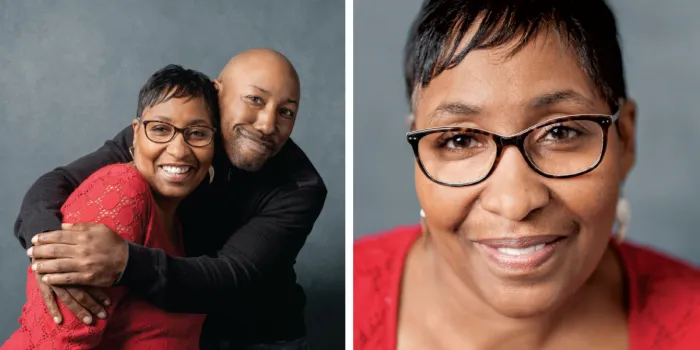As a board member of Hemophilia of South Carolina, Renita Johnson knows that better care for people with bleeding disorders starts with education. It’s a lesson she’s learned helping family members manage their hemophilia, and one she strives to pass on not only to the next generation within the bleeding disorders community, but also to the older generation who might be resistant or fearful of change.
Growing up in the small town of Bishopville, South Carolina, in the 1960s, Renita’s two older brothers lived with undiagnosed hemophilia, spending days at the hospital with bad bleeds. A family move to New York City proved fortuitous. There, her brothers were diagnosed by doctors at Mount Sinai Medical Center. “They knew all about hemophilia and explained everything to my mom and dad,” Renita says.
Doctors at Mount Sinai also made sure the entire family understood the disorder. Renita and her three sisters underwent carrier testing. Renita was the only carrier. When her son, Edwin, was born with severe hemophilia A in 1983, that’s when Renita’s advocacy began.
“My son had such a hard time with it growing up,” she says. “I knew I needed to educate people about his bleeding disorder. I educated everywhere he went, everywhere he stayed, whatever school he attended.”
Education was the key to a happy childhood for Edwin. Through Mount Sinai children’s camps and activities, Edwin gained self-confidence and a sense of belonging. “It was important for me to let his life be as normal as possible,” says Renita, who also learned to infuse Edwin, to prevent joint damage from his bleeds.
In 1998, Renita, Edwin and his sister, Oreene, who isn’t a carrier, moved to South Carolina to be closer to family. (Renita also has two nephews, ages 15 and 9, with hemophilia.) They settled in Richland County to be near the hemophilia treatment center at Richland Palmetto Health Hospital in Columbia (now called Prisma Health-Midlands Hemophilia Treatment Center of South Carolina). Always interested in learning more about bleeding disorders, Renita began attending Hemophilia of South Carolina (HSC) chapter events and encouraged Edwin to do the same. He has since mentored other boys on living well with hemophilia and has even taught them to self-infuse. “He takes time with them. I’m proud of him when he does that,” Renita says.
During a move back to New York in 2006 to earn her master’s degree in human resources, Renita kept advocating on Edwin’s behalf long distance, assisting her then-20-something son in navigating Medicaid and obtaining his Social Security disability income. When she returned to South Carolina in 2014, she immediately reconnected with HSC, reaching out to chapter Executive Director Suzanne Martin to find out how she could make a difference.
“When I met Renita, I saw in her immediately a passionate interest for learning more about hemophilia and resources for those affected and their families,” says Martin, who offered Renita an open board position in 2016. Today, Renita also serves on HSC’s South Carolina Hemophilia and Bleeding Disorders Advocacy Coalition, a partner in the National Hemophilia Foundation’s (NHF) State-Based Advocacy Coalition.
Education begins with understanding and compassion, Renita says. Within the bleeding disorders community, Renita has found that some older members, like her surviving brother, are unaware of or reluctant to use prophylactic treatment or to learn to self-infuse to avoid going to the emergency room to be treated for bleeds. Fear is a big factor, she says.
“They’re used to doing it the old way,” she says. “If they’re afraid, we say, ‘It’s OK to have fear, but let’s try to overcome this and get you on something that can help you more.’”
Her volunteer work has paid off, literally. Through her job at Merck pharmaceutical company, Renita gets to donate $500 to the charity of her choice once she hits 40 annual volunteer hours. She’s already hit that this year and has donated the full amount to HSC.
Since returning home to South Carolina, Renita has focused her advocacy efforts on ensuring the state’s hospitals have the proper resources and procedures in place to adequately treat people with bleeding disorders. Through her role in the state advocacy coalition, Renita has brought her message to legislators at South Carolina’s State House, meeting several times in the last year with Rep. Leon Howard, her son’s representative.
“I tell him, ‘You’ll keep seeing me, and we have to work together,’” she says. During a recent meeting with Howard, she was hopeful to learn that he’d been in touch with hospital administrators about developing better emergency room procedures.
Job training for older men with hemophilia is another educational focus close to Renita’s heart and expertise. “They may have bad knees, but they still want to work. So how do we help them?” she says.
Older people unable to find work often face societal stigma and are at risk for depression, Renita says. She’s pushing for more resources within HSC to help members with physical rehabilitation. For a recent chapter event, Renita lobbied to have a session on depression, which was well attended. “We have to talk about this. How do we help them go through this so they’re not ashamed?” she says.
Renita says she has a ready reply when asked why she’s still advocating now that Edwin is 36. “Yes, I’m still going to be advocating for him. I’ll advocate for him. For my brother. For my nephews. And for people who aren’t my family,” she says. “We want the world to be better for them. Better care for everyone. That’s why I advocate.”

